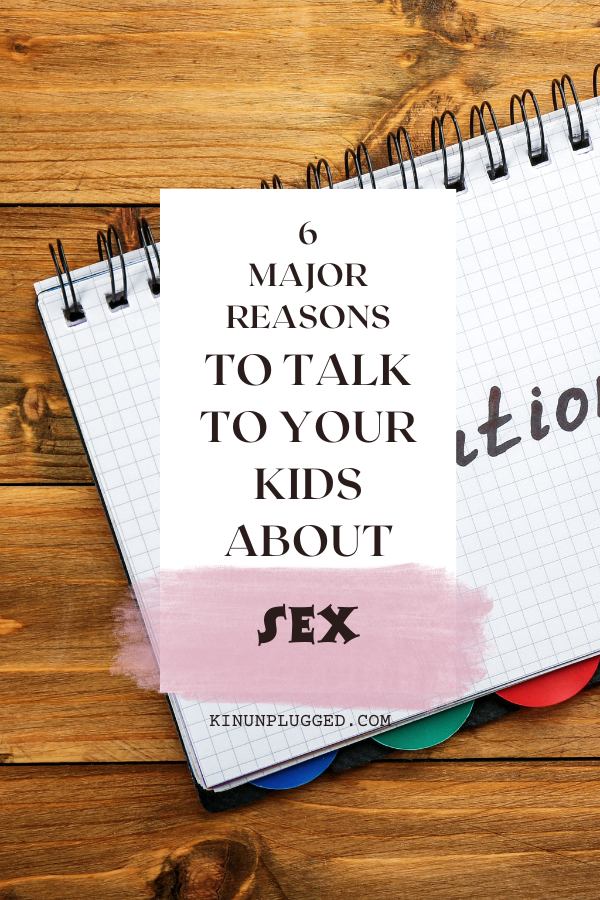If you’re wondering how to talk to your child about sex, I’m going to guess that they’re between the ages of 10 and 15. Let me know in the comment section below if I’m wrong and how old they really are!
In any case, you’re either nervous or just a very highly organized person who wants to plan out your conversation perfectly. I’ve got you! In this article, we’ll be looking at how to talk to your child about sex.
We’ll go into some detail discussing age appropriate sex education and also the best language to use when discussing sex with your kids.
What age to talk about sex

You’ll find that the majority of parents talk to their kids about sex anytime between the ages of 12-17. However, depending on the age different aspects of sex are discussed. For example, discussing the pleasurable aspects of sex might be left out when talking with 12 year olds while rape and various kinds of sexual assault are likely to be discussed by parents of kids of that same age.
Parents should decide which aspects of sex they think is most important for them to focus on with their kids at different stages of their mental and/or physical development.
Age-appropriate sex education

When deciding when to talk to kids about sex, age is one consideration but there’s also the importance of a gradual, ongoing conversation rather than a single “talk.” Research shows that age-appropriate information can help children make safer choices and foster open communication in the long term.
Here’s a general guide on age-appropriate discussions:
- Early childhood (ages 3-7). Start with basics about anatomy and boundaries, emphasizing consent in simple terms, such as understanding that their body belongs to them. Explain how they can talk to trusted adults if they feel uncomfortable with physical contact.
- Pre-teens (ages 8-12). Here, discuss bodily changes, relationships, and the emotional and physical aspects of puberty. Highlight healthy friendships and mutual respect. Conversations around internet safety and basic understanding of sex may begin if kids are curious.
- Teen years (ages 13+). At this stage, go deeper into topics like consent, contraception, STDs, relationships, and respect. Many parents wait until the mid-teen years to discuss the concept of intimacy and pleasure, which should include safe practices and understanding consent.
While these guidelines may help, it’s key to tune into your child’s questions and maturity because each child’s readiness for these topics varies (even within the same family!). Parents might also consider adding discussions on media literacy, given how accessible sexual content is online and to encourage them to ask questions whenever they come up.
Why you should talk to your child about sex

Talking to children about sex is important for several reasons.
- Encouraging healthy attitudes and relationships. Open conversations help children develop a respectful, healthy view of sex and relationships. They learn about concepts like consent, empathy, and boundaries, which set the groundwork for respectful relationships in adulthood.
- Reduces risky behavior. Research shows that children who are educated about sex from a young age are more likely to make safer choices, such as delaying sexual activity and using protection if they do become sexually active. When kids have accurate information, they’re less likely to be influenced by peers or misinformation.
- Builds trust and openness. When parents are open about this topic, it creates a supportive atmosphere that encourages children to approach them with questions. This openness can foster stronger communication, which is helpful as kids navigate complex emotions and experiences.
- Prepares them for puberty and bodily changes. Kids going through puberty may feel confused or isolated. Providing early, honest information on bodily changes can ease anxieties and give them confidence. It helps them understand these changes are natural and prepares them for what to expect.
- Promotes emotional well-being. Talking about sex can help kids understand the emotional implications involved, such as intimacy, attachment, and vulnerability. This equips them to make emotionally informed decisions and recognize unhealthy relationships.
- Counteracts misinformation. Kids today are exposed to more sexual content than ever through the internet, media, and social networks. By having conversations early, parents can ensure their kids are getting accurate, age-appropriate information rather than learning from unreliable sources.
How to talk to your child about sex

Talking to your child about sex is one of the most important conversations you’ll have as a parent and while it may feel intimidating, approaching the topic thoughtfully and gradually can make a real difference in their understanding and comfort. Here’s an in-depth guide on how to talk to your child about sex with sensitivity, clarity and confidence at each stage of their development.
1. Starting early with simple language (Ages 3-7)
For young children, talking about bodies, privacy, and boundaries sets the foundation for open discussions later on. How to talk to your child about sex at this age is less about specifics and more about helping them understand their bodies in simple, honest ways. Here are some key points to guide early conversations:
- Use correct terms. Start with basic anatomy using proper names like “penis” and “vagina.” Say something like, “Your body has different parts, and some are private.” This normalizes the terms, making later discussions feel more comfortable.
- Explain boundaries. Teach them that certain parts are private and that only specific caregivers (like doctors or parents in necessary situations) are allowed to help them with their bodies. For example, you can say, “Your body belongs to you and it’s okay to say no to any touch that makes you uncomfortable.”
2. Pre-teens: Answering questions and building knowledge (Ages 8-12)
As kids grow, they become curious about where babies come from, changes in their bodies and relationships. Knowing how to talk to your child about sex in a way that fits their age and understanding is key here.
- Introduce puberty. Explain the physical changes they’ll experience, like menstruation, body hair, and voice changes, to prepare them. Use reassuring language, such as, “Everyone goes through changes and your body is simply growing.”
- Explain reproduction in simple terms. Without diving too deep, say, “When people grow up, they can create babies together with the help of a part of the dad and a part of the mom.” Using terms like “egg” and “sperm” can help if they’re ready for more detail, but keep it straightforward.
3. Teenage years: Expanding the conversation (Ages 13+)
When teens start to explore relationships and emotions, how to talk to your child about sex broadens to cover emotional aspects, healthy boundaries, and responsibilities. Here’s a deeper look at essential topics for teens:
- Discuss consent and respect. Consent is crucial. Explain that mutual agreement is necessary for any kind of intimacy, saying, “If you’re not comfortable, it’s okay to say no, and the same goes for others with you.” Emphasize respect in all relationships, too.
- Address emotional aspects. When discussing intimacy, explain that it’s both physical and emotional. You might say, “Sex is often a way of connecting with someone you trust, and it’s something you should feel ready for.” Teens need to understand that emotions, like trust and respect, play a big part in healthy relationships.
- Talk about protection and health. Bring in practical information on contraception and protection against STIs. Explain why condoms and birth control are essential for safety and health, saying something like, “Condoms and birth control protect against infections and unplanned pregnancies, so using them is a responsible choice.” Be clear that protection helps avoid long-term consequences and keep relationships safe.
4. Using language and timing that fits your family’s values
Each family’s approach to how to talk to your child about sex will vary. Being open and encouraging questions can help. Here are some ways to build trust and keep the conversation flowing:
- Be open and receptive. Regular, open conversations help normalize the topic. If your child asks questions, answer calmly without judgment or discomfort. For example, if they ask why people kiss, you might say, “Kissing can be a way to show love or affection.”
- Share your values. Share your views on relationships and intimacy as they mature. For instance, you can say, “I believe it’s important to feel safe and respected in a relationship before making big decisions.”
5. Guiding them to make safe choices and build healthy relationships
As teens become more independent, they’ll benefit from guidance that shows how to talk to your child about sex as a part of making informed, healthy decisions. Encourage discussions on these topics:
- Healthy relationships. Explain that mutual respect and shared values are the core of any strong relationship. Let them know they should look for partners who respect their boundaries.
- Responsibility and safety. Reinforce the importance of taking responsibility for their health. Encourage them to ask questions whenever they feel uncertain or uneasy.
Make this an ongoing conversation rather than a one-time talk to create a safe space where they can come to you with questions and concerns. How to talk to your child about sex is about helping them grow into informed, responsible adults who respect themselves and others and it becomes easier the more comfortable you both get. This approach helps them see sex as a natural part of life that’s also deeply personal and tied to respect, consent and emotional health.
I hope this has been helpful for you as you go into this important topic with your child. Let me know how it goes.






